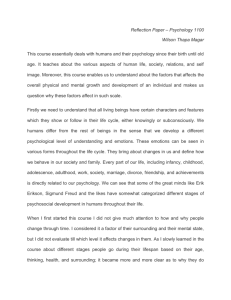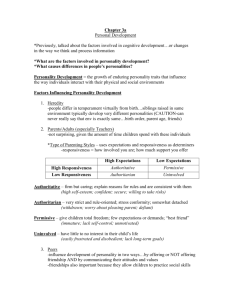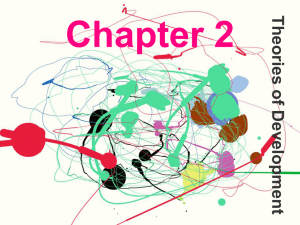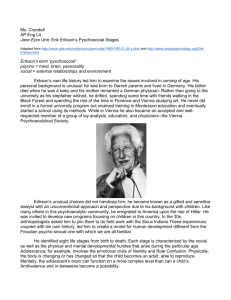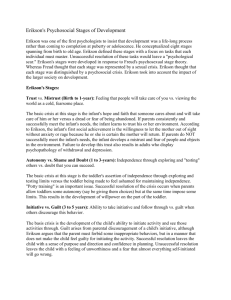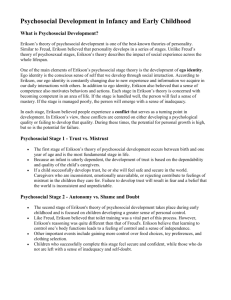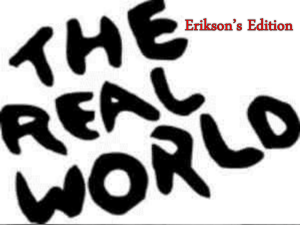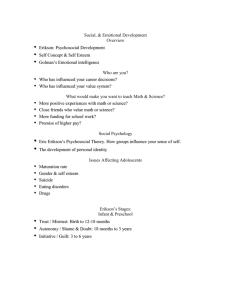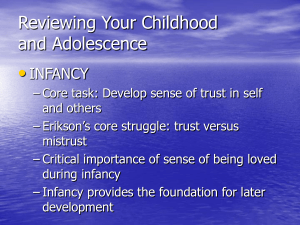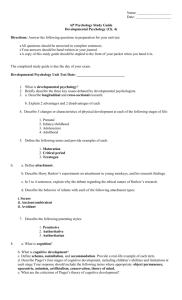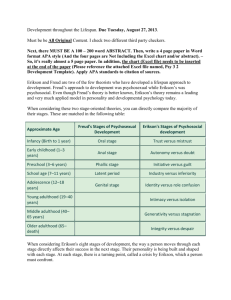Erik Erikson's Stages of Psychosocial Development Erikson's Theory
advertisement
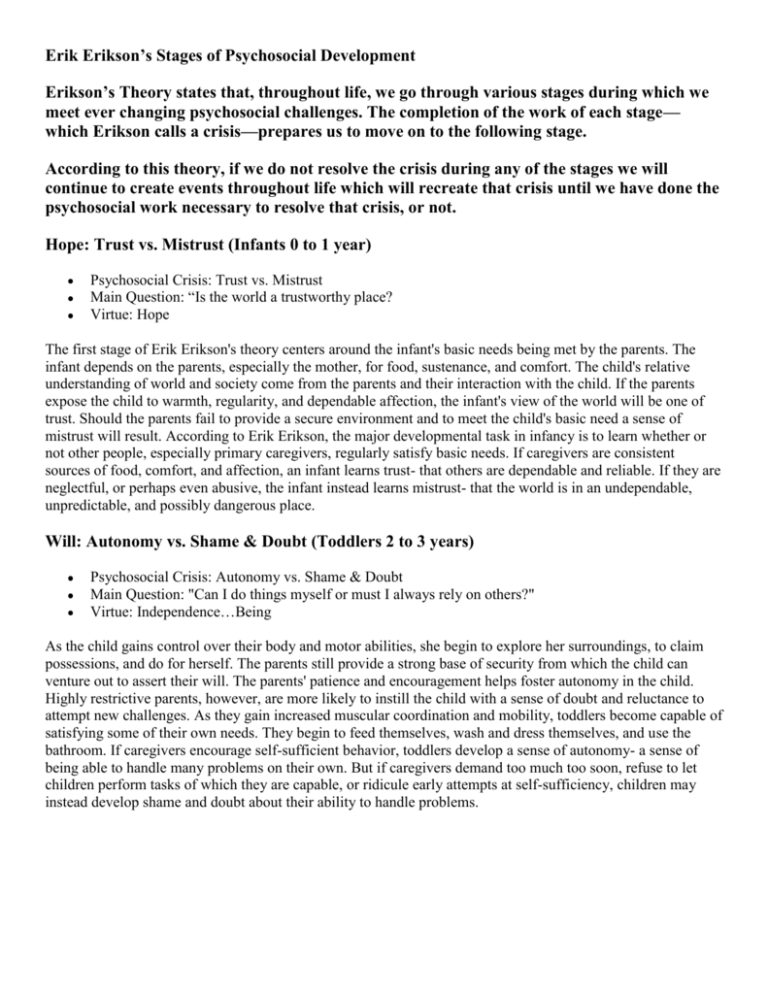
Erik Erikson’s Stages of Psychosocial Development Erikson’s Theory states that, throughout life, we go through various stages during which we meet ever changing psychosocial challenges. The completion of the work of each stage— which Erikson calls a crisis—prepares us to move on to the following stage. According to this theory, if we do not resolve the crisis during any of the stages we will continue to create events throughout life which will recreate that crisis until we have done the psychosocial work necessary to resolve that crisis, or not. Hope: Trust vs. Mistrust (Infants 0 to 1 year) Psychosocial Crisis: Trust vs. Mistrust Main Question: “Is the world a trustworthy place? Virtue: Hope The first stage of Erik Erikson's theory centers around the infant's basic needs being met by the parents. The infant depends on the parents, especially the mother, for food, sustenance, and comfort. The child's relative understanding of world and society come from the parents and their interaction with the child. If the parents expose the child to warmth, regularity, and dependable affection, the infant's view of the world will be one of trust. Should the parents fail to provide a secure environment and to meet the child's basic need a sense of mistrust will result. According to Erik Erikson, the major developmental task in infancy is to learn whether or not other people, especially primary caregivers, regularly satisfy basic needs. If caregivers are consistent sources of food, comfort, and affection, an infant learns trust- that others are dependable and reliable. If they are neglectful, or perhaps even abusive, the infant instead learns mistrust- that the world is in an undependable, unpredictable, and possibly dangerous place. Will: Autonomy vs. Shame & Doubt (Toddlers 2 to 3 years) Psychosocial Crisis: Autonomy vs. Shame & Doubt Main Question: "Can I do things myself or must I always rely on others?" Virtue: Independence…Being As the child gains control over their body and motor abilities, she begin to explore her surroundings, to claim possessions, and do for herself. The parents still provide a strong base of security from which the child can venture out to assert their will. The parents' patience and encouragement helps foster autonomy in the child. Highly restrictive parents, however, are more likely to instill the child with a sense of doubt and reluctance to attempt new challenges. As they gain increased muscular coordination and mobility, toddlers become capable of satisfying some of their own needs. They begin to feed themselves, wash and dress themselves, and use the bathroom. If caregivers encourage self-sufficient behavior, toddlers develop a sense of autonomy- a sense of being able to handle many problems on their own. But if caregivers demand too much too soon, refuse to let children perform tasks of which they are capable, or ridicule early attempts at self-sufficiency, children may instead develop shame and doubt about their ability to handle problems. Purpose: Initiative vs. Guilt (Preschool, 3 to 6 years) Psychosocial Crisis: Initiative vs. Guilt Main Question: "Am I good or am I bad?" Virtue: Purpose…Doing Initiative adds to autonomy the quality of undertaking, planning and doing tasks for the sake of being active and on the move. The child is learning to master the world around them, learning basic skills and principles of physics. Things fall down, not up. Round things roll. They learn how to zip and tie, count and speak with ease. At this stage, the child wants to begin and complete their own actions for a purpose. They learn that they can do many things. They also learn that, although they can do things, it is not necessarily a good idea to do some things. Guilt is a new emotion. They learn that some behaviors may make them feel less than happy about themselves. They are developing a conscience. The development of this independence balanced by inner controls is what defines the psychosocial work of preschoolers. Activities sought out by a child in this stage may include risk-taking behaviors, such as crossing a street alone or riding a bike without a helmet; both these examples involve self-limits. Negative behaviors are a result of the child developing a sense of frustration for not being able to achieve a goal as planned and may engage in behaviors that seem aggressive, ruthless, and overly assertive to parents. With growing independence comes many choices about activities to be pursued. Sometimes children choose tasks they can readily accomplish, but at other times attempt tasks that are beyond their capabilities or that interfere with other people's plans and activities. If parents and preschool teachers encourage and support children's efforts, while also helping them make realistic and appropriate choices, children develop initiativeindependence in planning and undertaking activities. But if, instead, adults discourage the pursuit of independent activities or dismiss them as silly and bothersome, children develop guilt about their needs and desire. Competence: Industry vs. Inferiority (Childhood, 7 to 12 years) Psychosocial Crisis: Industry vs. Inferiority Main Question: "How can I be good?" Virtue: Competence…Doing Something The aim to bring a productive situation to completion gradually supersedes the whims and wishes of short term activity. Children at this age are becoming more aware of themselves as individuals. They work hard at being responsible, being good and doing it right. They are now more able to share and cooperate. Their Psychosocial Development is related to their increase Cognitive abilities. Cognitively, children grasp the concepts of space and time in more logical, practical ways. They gain a better understanding of cause and effect, and of calendar time. At this stage, children are eager to learn and accomplish more complex skills: reading, writing, telling time. They also form moral values, recognize cultural and individual differences and are able to manage most of their personal needs. At this stage, children might express their independence by being disobedient, using back talk and being rebellious. Erikson viewed the elementary school years as critical for the development of self-confidence. Ideally, elementary school provides many opportunities for children to achieve the recognition of teachers, parents and peers completing projects, solving addition problems, writing sentences, and so on. If children are encouraged to make and do things and are then praised for their accomplishments, and begin to demonstrate industry by being diligent, persevering at tasks until completed. If children are instead ridiculed or punished for their efforts or if they find they are incapable of meeting their teachers' and parents' expectations, they develop feelings of inferiority about their capabilities. Sense of Self: Identity vs. Role Confusion (Adolescents, 13 to 19 years) Psychosocial Crisis: Identity vs. Role Confusion Main Question: "Who am I and where am I going?" Ego quality: Sense of Self The adolescent is concerned with how they appear to others. Identity is the accrued confidence that the outer sameness and continuity prepared in the future are matched by the sameness and continuity of one's meaning for oneself, as evidenced in the promise of a career. The ability to settle on a school or occupational identity is pleasant. In later stages of Adolescence, the child develops a sense of sexual identity. As they make the transition from childhood to adulthood, adolescents ponder the roles they will play in the adult world. Initially, they are apt to experience some role confusion- mixed ideas and feelings about the specific ways in which they will fit into society- and may experiment with a variety of behaviors and activities (e.g. tinkering with cars, baby-sitting for neighbors, affiliating with certain political or religious groups). Eventually, Erikson proposed, most adolescents achieve a sense of identity regarding who they are and where their lives are headed. Erikson is credited with coining the term "Identity Crisis" Each stage that came before and that follows has its own 'crisis', but even more so now, for this marks the transition from childhood to adulthood. This passage is necessary because "Throughout infancy and childhood, a person forms many identifications. But the need for identity in youth is not met by these." This turning point in human development seems to be the reconciliation between 'the person one has come to be' and 'the person society expects one to become'. This emerging sense of self will be established by 'forging' past experiences with anticipations of the future. In relation to the eight life stages as a whole, the fifth stage corresponds to the crossroads: What is unique about the stage of Identity is that it is a special sort of synthesis of earlier stages and a special sort of anticipation of later ones. Youth has a certain unique quality in a person's life; it is a bridge between childhood and adulthood. Youth is a time of radical change—the great body changes accompanying puberty, the ability of the mind to search one's own intentions and the intentions of others, the suddenly sharpened awareness of the roles society has offered for later life. Adolescents "are confronted by the need to re-establish [boundaries] for themselves and to do this in the face of an often potentially hostile world." This is often challenging since commitments are being asked for before particular identity roles have formed. At this point, one is in a state of 'identity confusion', but society normally makes allowances for youth to "find themselves," and this state is called 'the moratorium': The problem of adolescence is one of role confusion—a reluctance to commit which may haunt a person into his mature years. Given the right conditions—and Erikson believes these are essentially having enough space and time, a psychological moratorium, when a person can freely experiment and explore—what may emerge is a firm sense of identity, an emotional and deep awareness of who he or she is. As in other stages, bio-psycho-social forces are at work. No matter how one has been raised, one‟s personal ideologies are now chosen for oneself. Oftentimes, this leads to conflict with adults over religious and political orientations. Another area where teenagers are deciding for themselves is their career choice, and oftentimes parents want to have a decisive say in that role. If society is too insistent, the teenager will acquiesce to external wishes, effectively forcing him or her to „foreclose‟ on experimentation and, therefore, true self-discovery. Once someone settles on a worldview and vocation, will he or she be able to integrate this aspect of selfdefinition into a diverse society? According to Erikson, when an adolescent has balanced both perspectives of “What have I got?” and “What am I going to do with it?” he or she has established their identity
